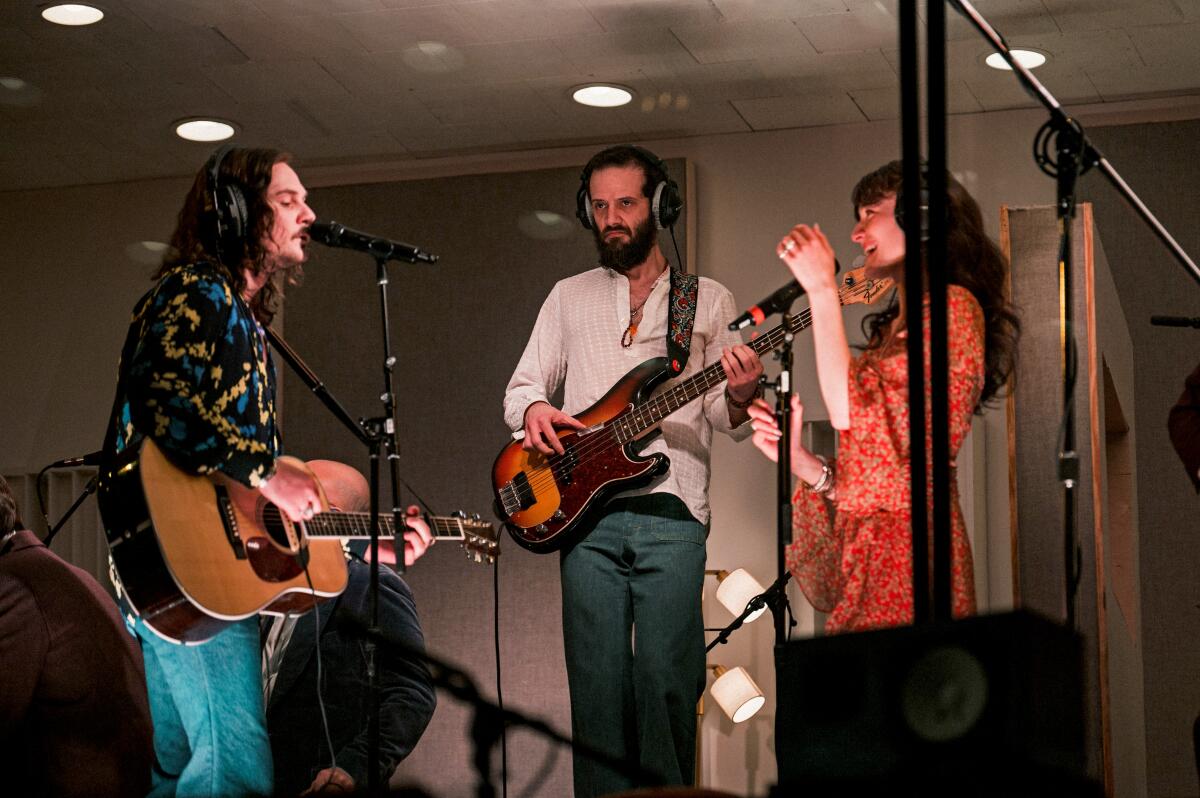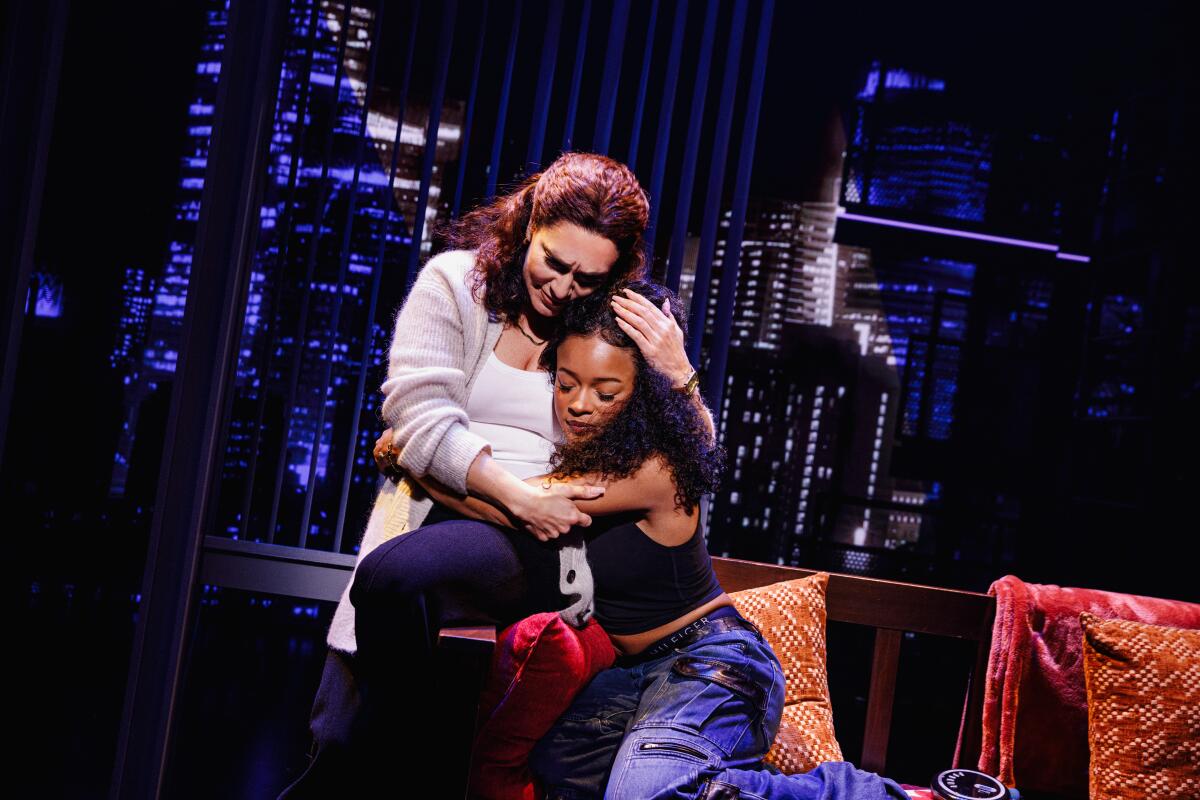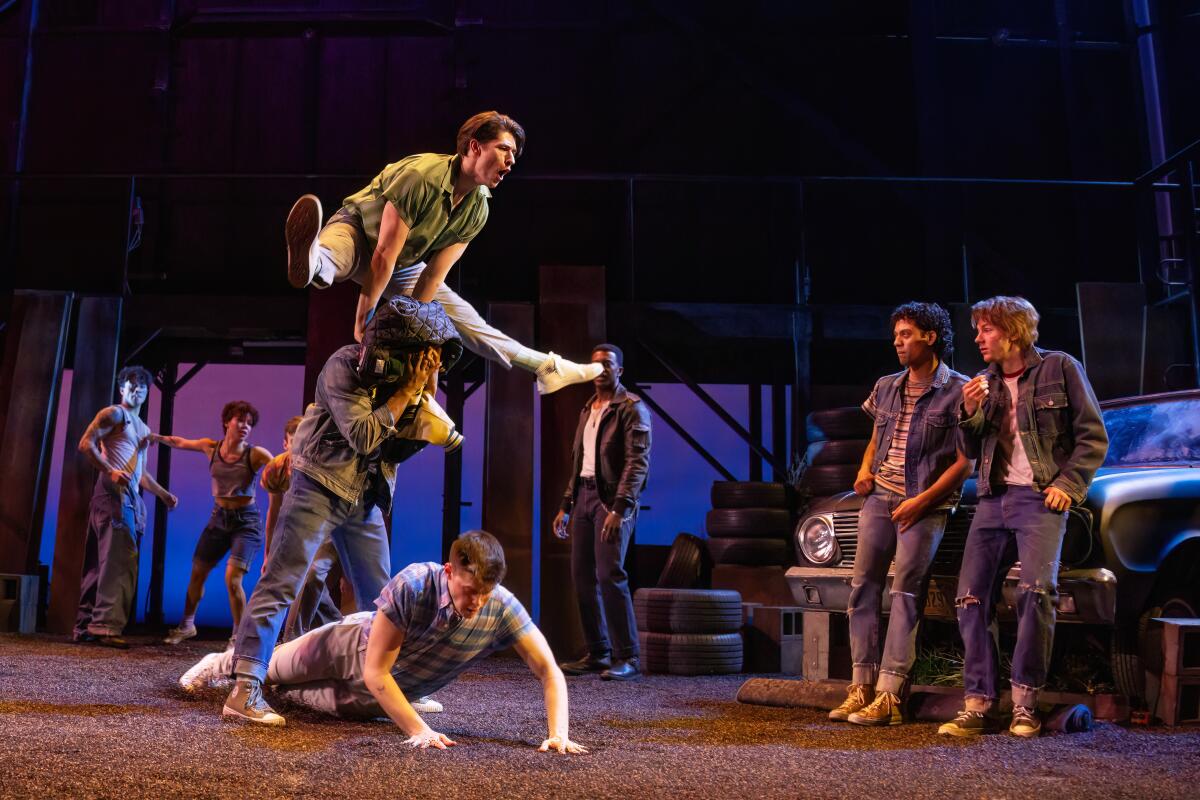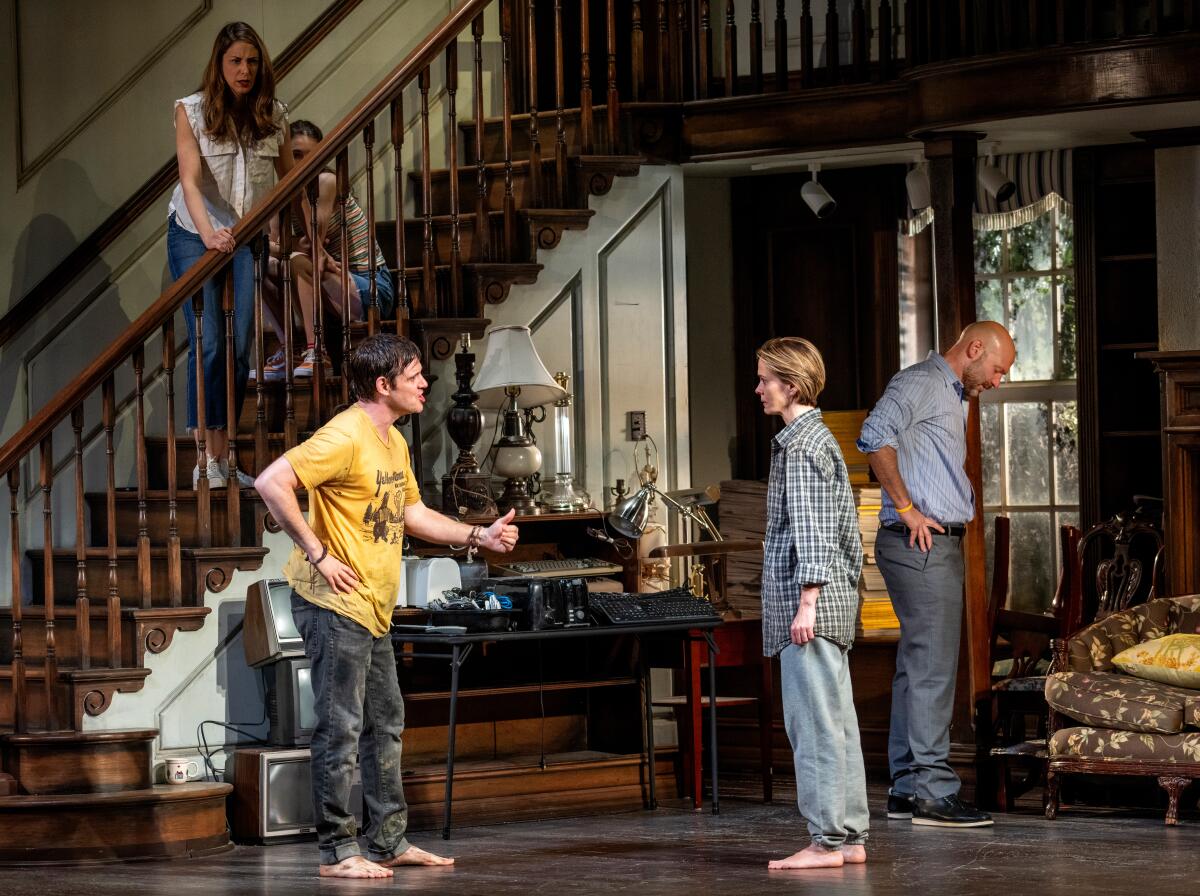Now that the Tony Awards have been doled out for the 2023-24 Broadway season, what can we conclude about a theatrical year that alternated between drought and flood?
One obvious point is that if you’re looking to develop a winner, an off-Broadway or regional theater is the way to go. For all their economic travails, nonprofit companies simply do it better.
“Stereophonic,” which won for best play, began at Playwrights Horizons. “The Outsiders,” which won for best musical in a dark-horse victory, had its world premiere at the La Jolla Playhouse. “Merrily We Roll Along,” which won for musical revival, transferred from New York Theatre Workshop. And “Appropriate,” which won for play revival, was launched at Broadway’s Helen Hayes Theater by Second Stage, a nonprofit with a rich off-Broadway history.
This trend ought to inspire companies across the nation, reminding them that they too can incubate work of the highest level for our most prominent stages. It also should challenge artistic directors to think less earnestly and more imaginatively, to prioritize ambition over safety and to provide a space for artists to discover new possibilities in novel collaborative arrangements.
These Tony winners, announced Sunday night in New York at the David H. Koch Theater at Lincoln Center for the Performing Arts in a ceremony hosted by Ariana DeBose, stand as models rather than automatic programming choices for the rest of the country. Not that I don’t wish to see them in Los Angeles; I sincerely hope they all arrive here. But I’m aware that what made them special may not be readily replicated elsewhere.

“Stereophonic,” about a 1970s rock band on the cusp of superstardom, is an immersive, intricately coordinated theatrical experience, our critic writes. The work won the Tony award for best play.
(Valerie Terranova)
Take “Stereophonic,” David Adjmi’s drama about a 1970s rock band on the cusp of superstardom. The group, which bears a striking resemblance to Fleetwood Mac, is working on a new album as long-simmering creative and romantic tensions explode.
The songs that are being painstakingly perfected in recording studio sessions are by Will Butler of Arcade Fire, and they lend this behind-the-music drama a lyrical spaciousness.
No new work this season has enjoyed such exuberant acclaim. But artistic directors shopping around for prize-winning titles should bear in mind that the Tony for best play honors more than the script. The award acknowledges the production as a whole, and the astounding success of “Stereophonic” is a credit to both the supreme integration of its parts and the breathtaking fearlessness of producers, who refused to accept that an extended offbeat drama by experimental artists couldn’t thrive on the commercial shores of Broadway.
The costumes by Enver Chakartash and Tony-winning scenic design by David Zinn capture the scruffy ambiance of the ’70s rock scene. The ensemble members live their roles in a way that makes it seem as if we’re eavesdropping on the quarrels and power struggles of the characters. The staging is meticulously calibrated by Daniel Aukin, an Obie-winning veteran with an avant-gardist’s rigor, who richly deserved his Tony for direction. “Stereophonic” isn’t just a play — it’s an immersive, intricately coordinated theatrical experience.
I can’t say that I’m dying to see this more than three-hour drama tried out by a local company with meager resources and limited rehearsal time. Such an outing would no doubt elicit another round of grumbles about the Broadway hype machine. A touring production might be the way to go, but could an economic model be found that would allow the play to travel to venues more appropriate for a play than a clamorous jukebox musical?
While that seemingly insuperable detail gets worked out, I would urge executives at HBO and its streaming rivals to consider optioning Adjmi’s drama for a new series, limited or otherwise. And to sign up the original cast, including Will Brill (who won for featured actor in a play), to maintain the same stoned authenticity.

Shoshana Bean and Maleah Joi Moon in “Hell’s Kitchen” at the Schubert Theatre. Moon won the Tony for lead actress in a musical for her performance as Ali, the gifted young protagonist of the work.
(Marc J. Franklin)
The race for best musical was anyone’s guess. Few would have been shocked if the winner had been “Suffs” (which took hefty prizes for book and score), “Hell’s Kitchen,” “Water for Elephants” or “Illinoise” (borne aloft on Justin Peck’s Tony-winning choreography). I assumed “Hell’s Kitchen” would get the nod for the simple reason that it was the one show I kept recommending to people looking for a euphoric musical experience. The production, directed by Michael Greif, is a love letter to New York from one of its beloved natives: singer-songwriter Alicia Keys.
Maleah Joi Moon, in a thrilling Broadway debut, won the Tony for lead actress in a musical for her performance as Ali, the gifted young protagonist of “Hell’s Kitchen,” who makes Keys’ hits her own. Kecia Lewis received the award for featured actress in a musical, and her heartfelt acceptance speech conveyed the profound emotional gravity of her portrayal of Ali’s mighty piano teacher.

Jason Schmidt, left, and Brody Grant in “The Outsiders” at the Bernard B. Jacobs Theatre on Broadway.
(Matthew Murphy)
But Tony voters spread the love around musical categories. In the end, artistic daring may have given the edge to “The Outsiders,” a musical adaptation of S.E. Hinton’s young-adult classic. I described the show as a “thrilling mess” when I reviewed it in its La Jolla Playhouse premiere, and I meant these words as a compliment.
Danya Taymor won for her spectacularly original direction in a stunning upset that also made discerning sense. Her visionary staging is the backbone of a show that features a book by Adam Rapp and Justin Levine and a score by Jamestown Revival (Jonathan Clay and Zach Chance) and Levine. The wide-ranging roster of producers, which includes Angelina Jolie and the Geffen Playhouse, hints at the varied forces that helped this underdog musical realize its dream.

The cast of “The Outsiders,” a musical adaptation of S.E. Hinton’s classic on Broadway.
(Matthew Murphy)
But ironically, it took a more than 40-year-old flop to restore everyone’s faith in the American musical. “Merrily We Roll Along,” the Stephen Sondheim-George Furth show that bombed when it premiered in 1981, finally found redemption on Broadway. The production, directed by Maria Friedman and starring Jonathan Groff, won the Tony for musical revival in what surely must have been a landslide victory. (If you saw the misbegotten revival of “Cabaret,” you know that I’m not being hyperbolic.)
Friedman, who found the beating heart of a musical that can come off as cold and cynical, may not have won the Tony for her direction, as most pundits expected. But she deserves a medal for elevating “Merrily” to the upper ranks of the Sondheim canon.
Groff, who had previously been nominated for his performances in “Spring Awakening” and “Hamilton,” earned his first Tony for his humanizing take on Franklin Shepard, the character at the center of the musical and historically the crux of its difficulty. Daniel Radcliffe, who won for featured actor in a musical, and Lindsay Mendez play Franklin’s best friends, who are bitterly disappointed in the way he’s sold out. They were invaluable in making “Merrily” the brightest story of the 2023-24 Broadway season.
How well will this revival travel? Very well, but having seen the earlier London version of Friedman’s revival, I have to say that there is a unique chemistry to the New York cast that shouldn’t be underestimated. If there’s any justice in the theatrical universe, PBS will film the show before it closes on July 7, so that more theater lovers can appreciate this tremendous achievement. The only downside is that Sondheim isn’t around to bask in the belated glory. Looking heavenward when accepting the award for best musical revival, Friedman was pleased to let Sondheim and Furth know that their recalcitrant masterpiece is now popular.
My biggest regret of my limited Broadway theatergoing was not getting to see the revival of Branden Jacobs-Jenkins’ “Appropriate,” which won for play revival. A last-minute scheduling change forced me to give up my tickets to a play I saw at the Mark Taper Forum in 2015. By all reports, Lila Neugebauer‘s production brought new subtlety to a family drama that rips the cover off society’s id.

Natalie Gold, left, Alyssa Marvin, Michael Esper, Sarah Paulson and Corey Stoll in “Appropriate.”
(Joan Marcus)
Sarah Paulson, who won for her lead performance, was heralded for her ability to tone down the melodramatics of her character without soft-pedaling the villainy. I can appreciate how good she must have been because Paulson managed to fend off a late-season charge from Jessica Lange, the star of Paula Vogel’s “Mother Play,” whose performance as the unaccepting mother of two queer children was one of the most spellbinding feats of acting I’ve seen this year.
PBS, which might want to call an emergency meeting with the producers of “Appropriate,” did a great service in presenting another contender for play revival, Ossie Davis’ “Purlie Victorious: A Non-Confederate Romp Through the Cotton Patch.” The galvanic performances of Leslie Odom Jr. and Kara Young, who won for featured actress in a play, are safely preserved and available for streaming.
“An Enemy of the People” — starring Jeremy Strong (who won for lead actor in a play) and Michael Imperioli — also was competing in this category (no matter that Amy Herzog’s new adaptation of Ibsen’s drama is as much her own work as Ibsen’s). But it’s hard to imagine this confluence of talent happening anywhere other than Broadway or London’s West End.
It was a stronger-than-expected year for new plays. “Mother Play” would work beautifully at the Geffen Playhouse, the Taper or Pasadena Playhouse. Amy Herzog’s “Mary Jane” would be a smart choice for the Kirk Douglas Theatre. The Geffen Playhouse has had a long relationship with Joshua Harmon (“Bad Jews,” “Significant Other”) and might want to offer L.A audiences his ambitious epic “Prayer for the French Republic.” And I sincerely hope that Jocelyn Bioh’s “Jaja’s African Hair Braiding,” a workplace comedy with serious concerns about immigration, will soon find a home on one of our stages. I saw the Broadway production of “Jaja’s” when it was still playing at the Samuel J. Friedman Theatre via the League of Live Stream Theatre and look forward to an in-person encounter, whether that’s through the Manhattan Theatre Club touring production or a fresh local staging.
Broadway is slowly accepting the reality that new thinking isn’t a luxury but a necessity. The rest of the theater world should follow suit. In an uncertain year, these admirable Tony winners, rather than providing automatic answers to programming woes, pose provocative questions and creative challenges. Artistic leaders might want to venture down the “Stereophonic” path for a change. In fearlessly embracing risk, they too might end up with the most Tony-nominated play in history.

